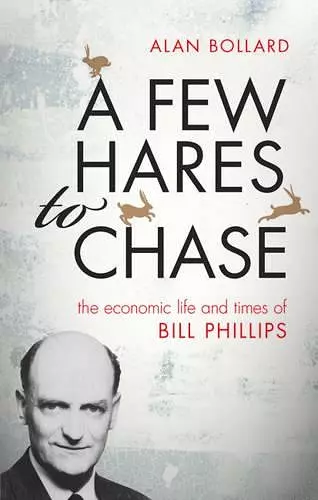A Few Hares to Chase
The Economic Life and Times of Bill Phillips
Format:Hardback
Publisher:Oxford University Press
Published:11th Feb '16
Currently unavailable, and unfortunately no date known when it will be back

The Phillips Curve is world famous amongst economists. The man who invented it was an inventor, an engineer, a genius, who led an exciting life and contributed to economics in many different ways. Born and brought up on a remote farm in rural New Zealand, his early life was a search for adventure. He invented toys and rebuilt machinery as a child. He experienced the rigours of the Great Depression on construction sites, and while still a young man he roamed the outback of Australia picking up casual work, sometimes working in gold mines, sometimes crocodile hunting. In 1937 he set off to discover militarising Japan, a guerrilla war in Manchuria, Stalin's Soviet Union, and the tensions in Europe. On the outbreak of war, he joined the RAF and was sent to Singapore where he rearmed planes but was eventually incarcerated in a POW camp by the Japanese. In camp he learned languages, invented gadgets for the troops and built a clandestine radio. If his first 30 years had been a search for adventure, his later life was a search for economic stability. Back in Britain after the war, he scraped through a sociology degree at the LSE, before convincing a sceptical faculty to let him build a hydraulic model of the economy. This beautiful complex machine was a great success and put Bill Phillips on the track of serious economics. In the next few decades he developed new ideas for stabilising economies, was one of the first to use electronic computers, developed the Phillips Curve, showed ways to help an economy to grow, and developed new techniques to model economies. Always innovative, he took another heading in his later years, working out how to stabilise the Chinese economy which was being wracked by the Cultural Revolution. Bill Phillips pioneered a dozen new directions in economics, making him one of the most innovative and influential of our economic pioneers.
What Bollard does, which makes the book so interesting, is to explain Phillips's work in the context of the time he was working and in the context of those working with him. * David G. Mayes, Insurance Risk,Central Banking journal *
Bill Phillips was an extraordinary person, a mensch, and for this reason alone I cannot but recommend that you read this biography by Alan Bollard... Bollard had met Phillips when he was a graduate student, and later learned more about what he had done. He wrote this book to share that experience (p. vi). I would like to thank him for having done so. It is a work of admiration, and rightly so. * Marcel Boumans, The European Journal of the History of Economic Thought *
This short sketch of Bill Phillipswill fill in some gaps for New Zealanders and economists especially connoisseurs of post-second world war LSE history. * Peter Morris, Financial World *
While his life was eventful, his career as an economist was short. Bollard has done a great service by presenting a fascinating account of the life and by reminding us of what Phillips' achievements as an economist actually were. * Kevin D. Hoover, Department of Economics, Duke University *
ISBN: 9780198747543
Dimensions: 223mm x 145mm x 22mm
Weight: 474g
276 pages